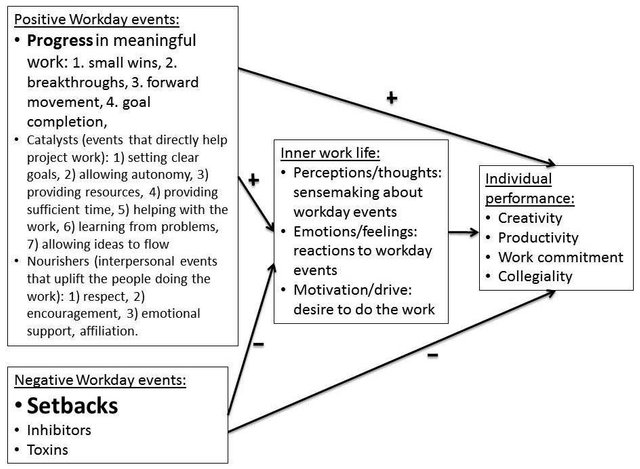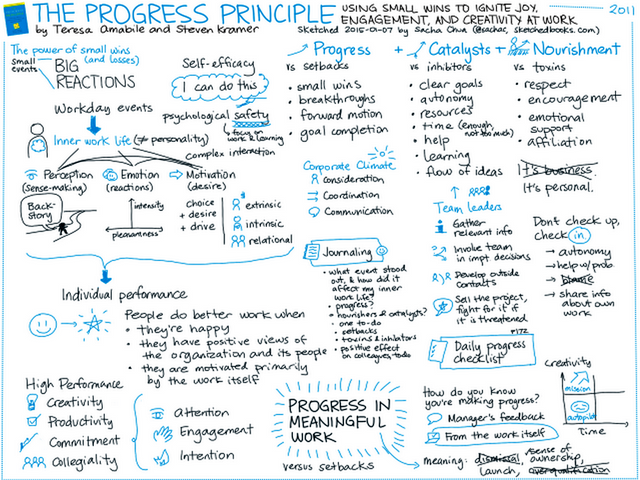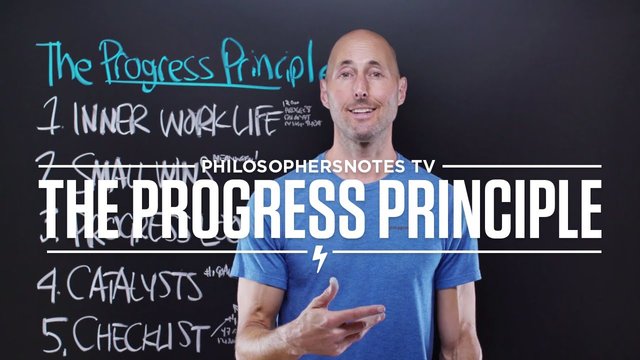
http://www.stevemasters.co.uk/recommended-reading/the-progress-principle/
In ”The Progress Principle”, Harvard Business School Professor Teresa Amabile argues that progress is the biggest factor for a positive work life. As she said in her book, “Small wins – seemingly minor progress events – can yield significant inner work life benefits”.
Professor Amabile’s study followed the work lives of 238 individuals, 26 teams, and 8 companies. For 19 weeks, researchers gave participants a daily questionnaire. Some of the questions were quantitative (e.g. “rank from 1-6 how well the team worked together”). Other questions were qualitative “briefly describe one event from the day.”
Amabile’s research discovered the power of progress. More than other factors (e.g. incentives, recognition, clear goals, etc.) progress contributed to a productive and meaningful day.
Students should listen up. By understanding the importance of progress, you can become more productive, creative, and happier in your work.
Distilling lessons from “The Progress Principle” isn’t easy. So, if you want a deeper look, read the book. But, here are five simple ways you can apply “The Progress Principle”.
1. Embrace small wins
“ Even incremental progress can increase people’s engagement in the work and their happiness during the day” - Teresa Amabile, The Progress Principle
We can’t make huge leaps everyday. But, progress doesn’t need to be large. As Amabile’s research shows, the effect of a small-victory can last for multiple days. As she explains “a person’s inner work life.. fuels his or her performance for the day and can even affect performance the next day”.
We need to celebrate small victories. In doing so, we recognize the progress we’ve made. Keep a diary of daily successes. Give high-fives to your roommate. Go out for tea with a friend. Make sure you celebrate success. It’s key to maintaining long-term motivation.

http://www.progressfocusedapproach.com/the-progress-principle/
2. Break your work into small-tasks
“I long to accomplish a great and noble task, but it is my chief duty to accomplish small tasks as if they were great and noble.” - Helen Keller
How can you make progress more obvious? Break large goals into small tasks. For every project or assignment make each step clear. If you’re creating a presentation for class, divide “write an outline”, “fill-in outline”, and “design powerpoint” into separate tasks. By doing so, you’ll maintain focus and increase internal motivation. Make sure to recognize progress at every step. Break larger goals into small-tasks.

http://sachachua.com/blog/2015/06/moving-past-getting-things-done/
3. Structure work to have immediate feedback
“You can’t get a sense of progress unless you’re aware that you have actually made progress in your work ” - Teresa Amabile, The Progress Principle
As researchers Richard Hackman and Gregory Oldhaham explain there are two routes to feedback. The first relies on other’s appraisal. You turn in an essay. Then your teacher gives comments on how you’ve done. The second route, however, is preferable: getting feedback from the work itself.
Programmers, for example, can run their programs through a series of tests. If the tests are successful, then the programmer knows that he/she has progressed. But, what if another programmer controls testing? In this case, the original programmer won’t receive immediate feedback. As well, he/she won’t gain the emotional jump from making progress.
Think about your work. Does it have immediate feedback? Do you see it? If not, how you can add feedback? Attending office hours, meeting with professors, or checking work in real time are all examples. Incorporate immediate feedback to encourage positive thinking.

https://www.youtube.com/watch?v=XD6N8bsjOEE
4. Help fellow students see progress
*“ Many say it’s business, not personal. But (work) IS personal” *- Teresa Amabile, The Progress Principle
Leaders overlook the importance of progress. A study of 669 managers showed that leaders rank “suporting progress” as the least important factor in employee motivation. (compared to “recognition, incentives, interpersonal relationships, and goals”). Only 5 percent of managers ranked making progress the most important factor.
Don’t repeat their mistake. In order to better lead peers or motivate friends, focus on their progress. Make it easy for them to see the improvements they’ve made. As well, reinforce the team’s growth as a whole. In doing so, you’ll help friends stay motivated in the long-run.

https://www.youtube.com/watch?v=SmQzXyjBbL4
5. Eliminate small annoyances
“The connection between mood and negative work events is about five times stronger than the connection between mood and positive events” - Teresa Amabile, The Progress Principle
Progress is great. But, setbacks are worse. As Teresa Amabile explains “although progress increases happiness and decreases frustration, the effect of setbacks is not only opposite… it is greater”.
As research from the University of Calfornia shows, daily hassles predict mood better than major life events. So, though making progress is important, make sure you eliminate annoying roadblocks first.
If you’re computer is broken, don’t wait. Fix it now. If your project-partner can’t check his work without you, help him out immediately. Focus on eliminating hassles. As a leader this will empower others. As a student, this will empower yourself.

“The Progress Principle” should reframe how we approach the day. Make task revolve around small, tangible steps. Avoid minor setbacks. Finally, reinforce progress when leading groups. If you do this, you’ll help teams stay positive. As well, you’ll keep yourself motivated throughout the day.
Don’t fall back to old habits. Make progress with “The Progress Principle”.
